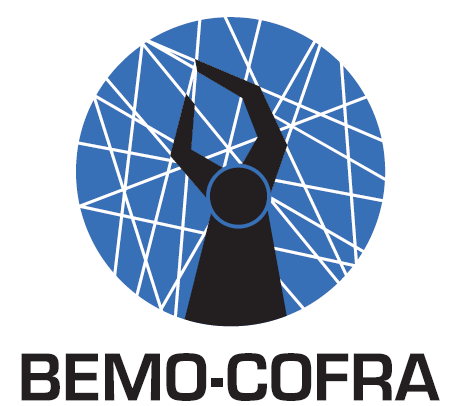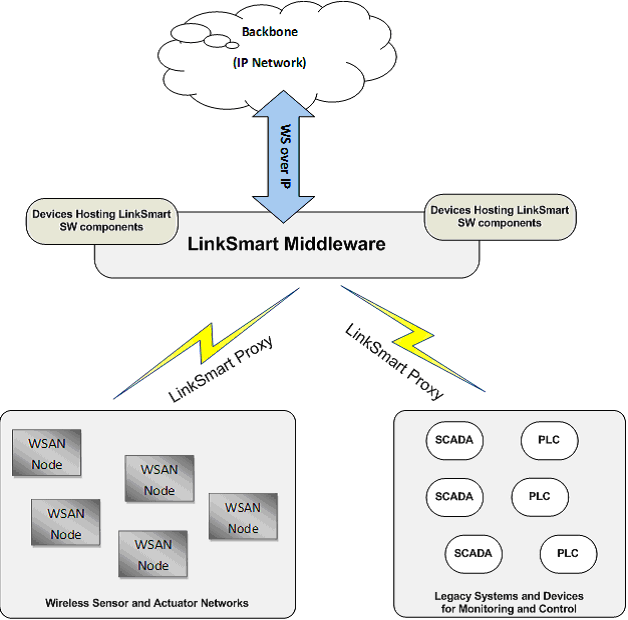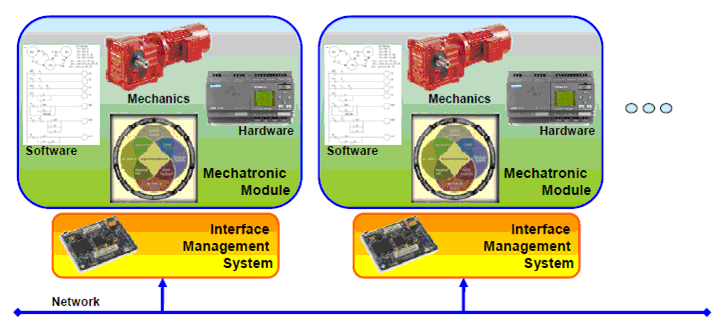The BEMO-COFRA project is a 30 month EU-Brazil collaborative project that will develop an innovative distributed framework allowing networked monitoring and control of large-scale complex systems.
BEMO-COFRA reuses the results of the well-reputed Hydra IP and Pobicos STREP and the recently started ebbits IP featuring a Service Oriented Architecture (SOA) and a middleware able to expose smart objects, legacy devices and sub-systems’ capabilities by means of web services. Syntactic and semantic interoperability among coexisting technologies in the overall monitoring and control framework is made available. WSAN devices, legacy sub-systems and devices will thus be able to interact and cooperate, orchestrated by a manager in charge of enforcing a distributed logic with the overall monitoring and control network.
The integration of heterogeneous smart objects, legacy devices and sub-systems will achieve overall systems’ efficiency with respect to energy and raw materials and support holistic management. The BEMO-COFRA project will address both technological aspects and user needs to promote a wider adoption of large-scale networked monitoring and control solutions.
Rationale
The European manufacturing industry suffers a deep crisis due to an overcapacity of production, while in Brazil there is a steady economic growth that is pushing manufacturing companies to increase their production rates. Despite these differences, in both the geographic areas there is an increasing need for flexibility in production activities that must adapt to a continuously changing world market demand.
According to medium to long term European and Brazilian research roadmaps, ICT will enhance any real world object, even the simplest one, with sensing, actuation, embedded processing and communication capabilities. The resulting smart objects will be in principle heterogeneous with respect to energy, sensing/actuation capabilities as well as processing and communication resources. They will interact with each other and will get even smarter through cooperation, forming in such a way communities of self-organizing heterogeneous networked cooperative elements.
Project data
Such communities are envisioned to act as enablers for an effective monitoring and control of physical processes, realizing pervasive and ubiquitous computing approaches. The possibly large number of cost efficient and versatile networked objects allows gathering and retrieving information from systems as well as operating with actuators to modify systems’ behaviour (e.g. in response to specific detected conditions). In fact, the considered networked elements define the means to bridge the gap between the physical process and the virtual process i.e. an abstract aggregated representation of the real one. This also enables the adoption of more flexible and holistic approaches for the supervision of complex systems as well as the achievement of higher systems efficiency.
Architecture
The overall system of the BEMO-COFRA architecture will represent a comprehensive, distributive framework comprising a middleware layer, large WSANs, PLC and SCADA systems, and not least computers and powerful devices being deployed in manufacturing plants.
A platform for dealing with WSANs will be developed that provides any means to control and monitor manufacturing. To provide IP-based services for WSANs the existing LinkSmart® middleware (EU HYDRA-Project) is going to be utilized, i.e. LinkSmart proxies for WSANs will be developed to offer WSANs based functionality to the outside world. Further, LinkSmart proxies for PLC and SCADA systems are required.
The LinkSmart middleware proved to be a helpful tool for application and device developers to interconnect seamlessly heterogeneous devices; as proof-of-concepts application prototypes in three different domains were developed: agriculture, smart home, and eHealth. However, in manufacturing domain it is exposed to new constraints, such as demand of high dependability in real-time or quasi real-time in production process. Hence, improvements in the sense of modification or extensions of LinkSmart middleware are needed. Furthermore, event-based development might be extended as well, e.g. allowing for synchronized notifications of event subscribers.
Deployment in a Manufacturing Plant
BEMO-COFRA strives for the realization of a large-scale distributed monitoring and control framework that eases the supervision and the optimization of physical processes. The potential impact of the developed solution will be made visible by demonstrating the capabilities of a BEMO-COFRA-enabled production monitoring and control system deployed in an actual manufacturing plant provided by COMAU.
In fact, the BEMO-COFRA infrastructure represents a suitable solution for the management of large-scale complex systems in different application domains, e.g. transportation, power and manufacturing. Despite some peculiarities, all such application domains are characterized by a highly networked environment and by an increasing need for integration of different heterogeneous technologies. However, the manufacturing environment poses further unique challenges in terms of harsh radio propagation conditions, dependable operations, real-time or quasi real-time communication constraints and also mobility (e.g. smart objects installed on board moving parts of a production line) that make it particularly suitable for BEMO-COFRA validation purposes.
In a manufacturing plant, hundreds of machines operate at the same time. Monitoring and controlling relevant parameters of each of the considered machine is traditionally performed by means of PLCs, SCADA systems and other special purpose systems possibly connected to ERP and MES. In this scenario, the pervasive adoption of heterogeneous WSANs is being increasingly considered as a promising solution to support the monitoring and control task and would significantly help improving efficiency, dependability and safety of operations. It is worth stressing that this considered scenario is also characterized by changing conditions due to production customization, fluctuations in market demand, as well as plant maintenance and modernization.
Therefore there is a clear need for an overall framework enabling the desired level of flexibility and allowing an easy and dynamic integration of different heterogeneous technologies. The flexibility of the BEMO-COFRA framework is demonstrated in the manufacturing scenario by deploying a comprehensive distributed system architecture capable of easily integrating and interconnecting innovative large-scale WSANs, as well as legacy components such as PLCs, SCADA systems, and not least computers and powerful devices being deployed in manufacturing plants.
In the future, the approach proposed by BEMO-COFRA will lead to production systems characterized by standard hardware and software architecture, easy to be installed, and composed by modular “plug & play” mechatronic sub-systems which do not require setup operations other than configuration.
The main goal of the deployment in the manufacturing scenario is to demonstrate how the BEMO-COFRA framework can help improve the overall manufacturing plant efficiency in terms of energy and raw materials despite the challenges posed by the harsh industrial operational environment.
Expected Project Outcomes
The main envisaged outcomes and results will provide a highly relevant industrial impact, by improving factories productivity through the adoption of distributed control architectures and innovative MES systems. New production processes will be able to adapt to new productive targets and needs with a low impact in terms of costs, development, set-up and ramp-up times.
Major benefits derived from the activities will be:
- the overall increase of flexibility, performance and re-configurability of new agile manufacturing systems: today the investment cost spent in average for reconfiguring existing production facilities is indicated as nearly to 40% of initial investment;
- an optimal operation maintenance despite varying conditions;
- an improvement in efficiency of at least of 25%, accompanied by greater equipment uptime (till 95%) in cases of major variations/uncertainties in process parameters and/or in cases of frequent managed changes in production.
Partners
- Fraunhofer Institute for Applied Information Technology, Germany (Coordinator)

- CNet Svenska AB, Sweden

- In-JeT ApS, Denmark
- Istituto Superiore Mario Boella, Italy

- Valtion Teknillinen Tutkimuskeskus, Finland

- Comau do Brasil Indústria e Comércio Ltda., Brazil

- Federal University of Pernambuco, Brazil

- Federal University of Amazonas, Brazil

- iVision Ltda, Brazil

Funding
Co-funded by the European Commission 7th Framework Programme for Research and the Conselho Nacional de Desenvolvimento Científico e Tecnológico in Brazil.
















